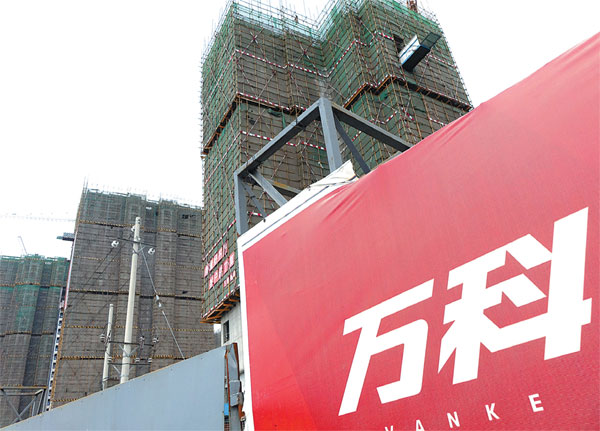China's pioneering entrepreneur
Transformations in the nation's largest residential real estate developer are mostly a reflection of the personal changes in its dynamic chairman
Among Wang Shi's many hobbies are sailing, gliding and mountaineering. An adventurer at heart, the chairman of Vanke, the nation's largest residential real estate developer, successfully reached the Seven Summits, the highest mountains of each of the seven continents, from 2002 to 2004. In 2005, he reached the North and South Poles.
While Wang's adventurous achievements have long been chronicled, what hasn't been widely discussed are his recent educational pursuits. From 2011 to 2013, he attended Harvard University as a visiting scholar. Last year, he took several classes at the University of Cambridge.
|
A real estate project of Vanke, China's largest residential real estate developer, in Zhengzhou, Henan province. Provided to China Daily |
Looking back, Wang says the studies abroad greatly transformed and enriched his views of the world. The experience, he says, has also been a powerful influence on how Vanke currently does business.
In recent years, Vanke has shifted in focus from purely being a property developer to becoming a national leader in green building technologies.
At the Asia Business Forum hosted by London Business School in January, Wang said Vanke's evolution began five years ago when he heard then premier Wen Jiabao's announcement that China would be committed to tackling climate change and reducing its emissions.
Vanke then began targeting high-tech construction techniques and expanding its range of property development to resorts and retirement homes.
"I realized that Vanke needed to face the future. A commitment to reducing climate change is the responsibility of China as a nation and its individual entrepreneurs. And it makes business sense in the long term, as greener technologies will lead to reductions in the use of resources like water and timber," he says.
"I want to do more to push the whole green building sector forward, so China can fulfill its promise on climate change."
Wang, born in 1951 in the Guangxi Zhuang autonomous region, established the Shenzhen Modern Scientific Education Equipment Distribution Centre in 1984, which became later known as China Vanke Co Ltd.
Vanke has since become China's largest residential real estate developer, with around 200 billion yuan ($32 billion; 28 billion euros) in sales in 2014. It garnered a listing on the Shenzhen Stock Exchange in 1991.
Although Vanke has only constructed 3 percent of China's total residential properties, the company claims it has constructed about 30 percent of the nation's green buildings.
He says an important green building technology favored by Vanke is prefabrication, which saves significant amounts of timber, water and energy compared to traditional technologies.
Prefab entails the assembling of a building's components in a factory and transporting them to the construction site where the structure is to be located.
In 2009, Vanke built the first top-level green project certified by the Chinese government. In the next year, Vanke built one out of every two three-star green projects in China.
The rating system by the Ministry of Housing and Urban Affairs awards one to three stars (three being the highest) for every building that achieves the highest standards in the usage of energy, water, land and materials.
Vanke has been opening several research and development centers since 2000 to examine green building technologies in Chinese cities including Guangdong and Beijing.
It is also in the process of setting up R&D centers overseas, such as the United States and the United Kingdom, to take advantage of the best technology and talent around the world.
"Having a long-term vision is a great way to stay ahead of competition," says Wang.
Another important shift for Vanke is the company's greater use of its overseas network of agencies to help Chinese customers study, tour and invest abroad.
Currently, Vanke has around a million residential households in its customer base, but Wang believes this amount will increase dramatically in ten years. He says he hopes to use its overseas network of agencies to provide these customers with practical services.
"We will cooperate with our overseas partners to provide reliable information to our Chinese customers if they wish to study, tour and invest abroad. This is a win-win situation that can maximize the efficiency of our resources and networks," Wang says.
These agencies, for instance, can help customers find schools or universities abroad for their children, a process that Wang says is far more convenient than if customers went out scouting schools for themselves.
Aside from the new developments at Vanke, the last few years have been a time of personal growth and achievement for Wang. Reflecting on his stints at the two universities, Wang attributes his constant pursuit of learning to his early education experience.
Having graduated with a bachelor's degree from the water supply and drainage faculty at Lanzhou University in Gansu province, he says one of his biggest dreams growing up has always been to receive an education from a leading university overseas.
"I think I gave up my dream at the age of 50, and instead decided to achieve life challenges through adventurous activities," Wang says.
What followed were Wang's headline-worthy achievements in mountaineering and seafaring from 2002 to 2005.
But in 2010, he was invited by a representative at Harvard's China Fund to study there. It was an opportunity he could not pass up.
For Wang, it was a difficult time, having to learn English from scratch and living an unfamiliar lifestyle.
"I didn't even know how to open a bank account. I had to experience all sorts of simple things for the first time, but it was a valuable learning process," he says.
"When I first arrived at Harvard, the academic pressure was pretty full on. I had to study until around 2 or 3 in the morning, and borrow my classmates' notes to read," Wang recalls. "I was exhausted, but excited, as I have always loved learning new things, and wanted to travel abroad to study."
cecily.liu@chinadaily.com.cn

























